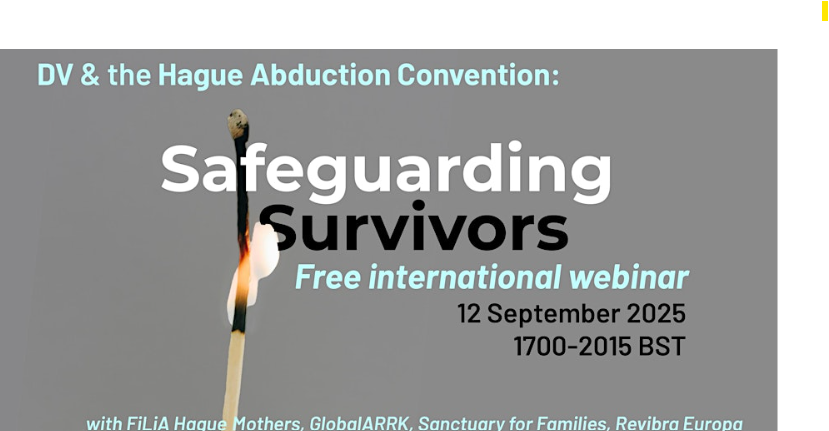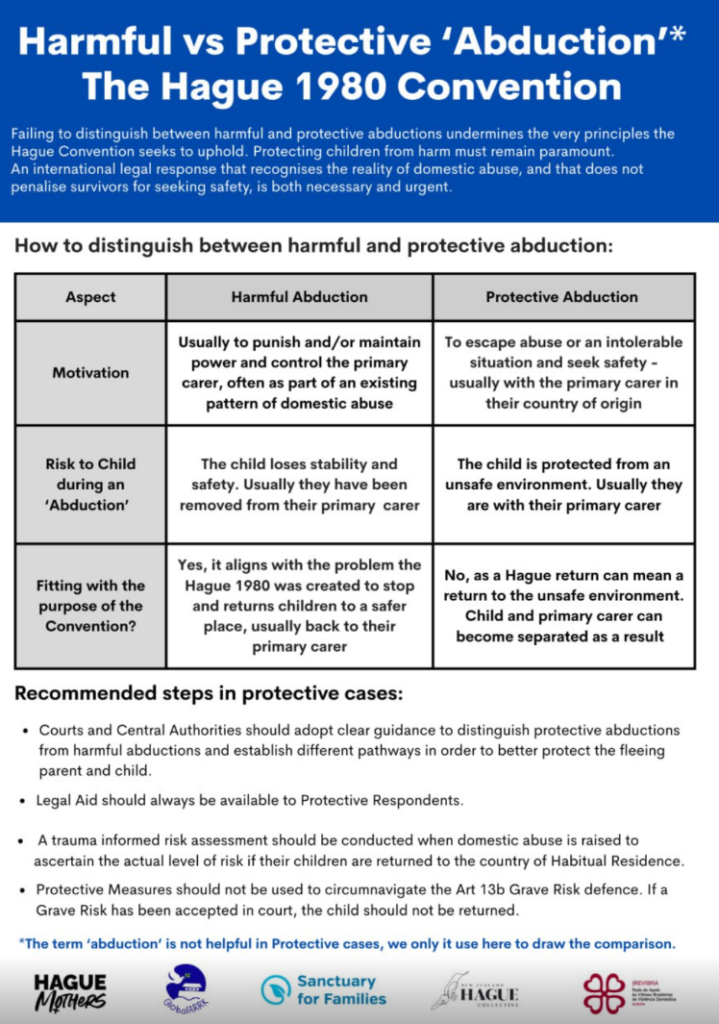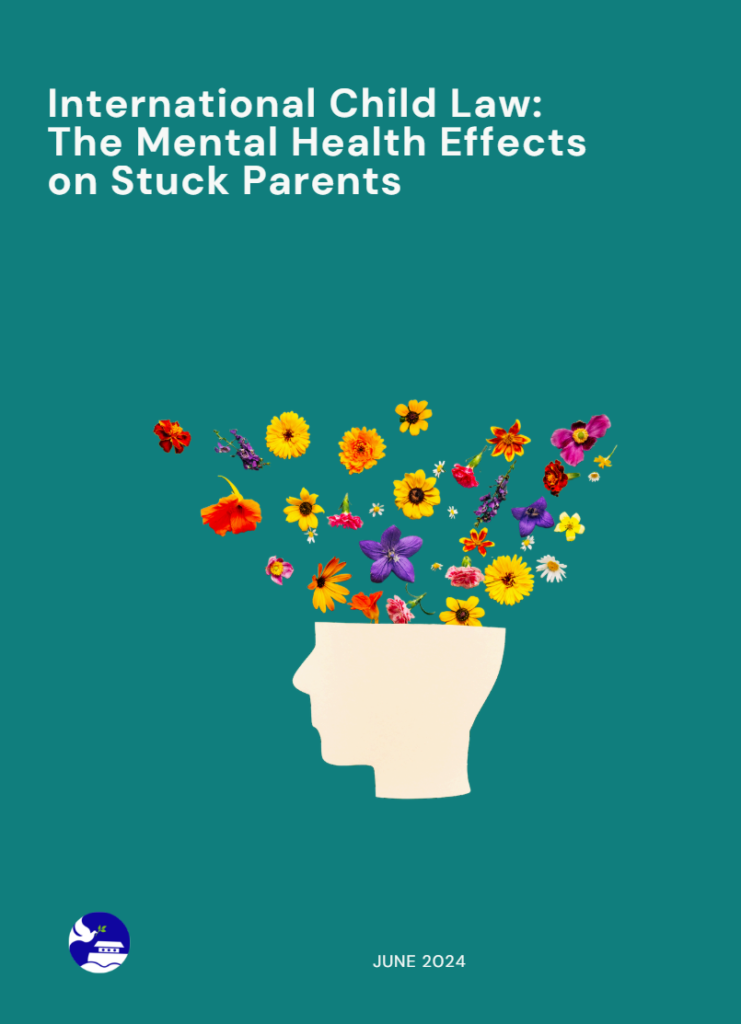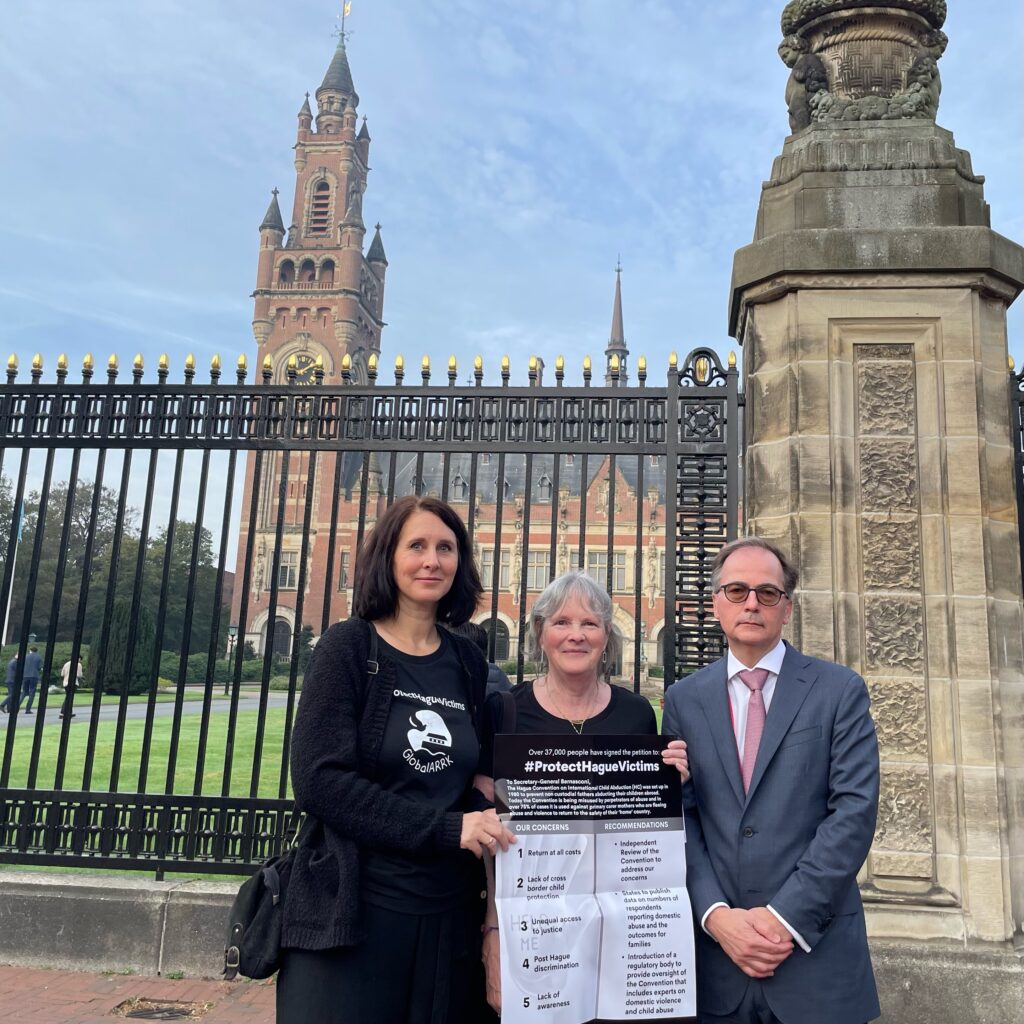GlobalARRK News
From the Peace Palace to Brazil: Our Journey to Give Hague Victims a Voice
In October 2023, standing outside the Peace Palace in The Hague, Ruth Dineen from FiLiA Hague mothers and I held a petition signed by over 37,000 people calling for the protection of mothers and children harmed by the Hague Convention. When we handed over our petition, Christophe Bernasconi, Secretary General of the Hague Conference on Private International Law (HCCH), stepped out to meet us. He listened and promised to try to do something.Later that day, inside the historic Peace Palace at the Special Commission meeting attended by all the member states of the Convention, he proposed the creation of a new Forum, one that would bring together all stakeholders to discuss domestic abuse, child welfare, and the Hague Convention. For the first time, survivors, advocates, judges, and government representatives would sit at the same table.When Ruth and I were invited to join the Steering Committee, it felt like a breakthrough, a rare chance for survivor voices to be heard at the heart of international law. But we quickly discovered how hard that would be.The first Forum was held in Sandton, South Africa in June 2024. The committee included judges, government officials, and representatives for both survivors of domestic abuse and “left-behind parents.” For the first time, policy makers heard lived experience testimonies in person – raw, brave, and heart-stopping. The room fell silent. Even the hardest hearts softened as survivors shared how they had fled violence, only to be branded “abductor” and returned under the convention to harms way.For the first time, there was understanding. Christophe closed the meeting with a call to preserve the “Spirit of Sandton” and Brazil offered to host the next Forum. We left feeling cautiously optimistic. Read the HCCH report here. The Road to BrazilWe believed the next Forum, scheduled for Fortaleza in October 2025, would focus on solutions – real, practical change.But as planning progressed, the tone shifted. We learned there would again be no concrete next steps, conclusions or formal recommendations. The resistance to change, especially from certain European states, was palpable.We worked tirelessly for many months collecting, filming, and anonymising survivors’ testimonies to show at the Forum. These were powerful stories, brave mothers risking everything to protect their children.Yet, at the last minute, we were told the videos could not be part of the programme because the “left-behind parents” hadn’t had time to produce their own. We were devastated on behalf of the brave survivors who had shared their stories.I managed to negotiate with local organisers to play the videos in the main hall during lunch, but no official announcement was made. Few people came to watch. I sat there like it was a vigil – for the women and children the system continues to silence. Inside the Forum: Polarised sidesThe opening speeches in Brazil were passionate and full of hope for survivors. Brazilian government ministers and women’s rights leaders, including Maria da Penha, spoke powerfully about ending violence against women and reforming the Hague system.But as the sessions unfolded, we lurched between two seemingly diametrically opposing views of abduction – some speakers claimed all removals were “wrongful.” and dismissed survivors’ experiences as […]
GlobalARRK’s DV & The Hague Abduction Convention: Safeguarding Survivors Forum with Reem Alsalem (UN Special Rapporteur on violence against women), Dr Charlotte Proudman
Over 500 people from around the world joined us live for a powerful and timely webinar: “DV & the Hague Abduction Convention: Safeguarding Survivors.” This international event was jointly hosted by FiLiA Hague Mothers, GlobalARRK, Sanctuary for Families, and Revibra Europa in the lead-up to October’s HCCH Forum on Domestic Violence and the Hague Convention in Brazil. Together, we brought survivor voices, legal expertise, and frontline experience to the table — shining a light on the urgent reforms needed to better protect mothers and children who experience domestic violence within the framework of the Hague Abduction Convention. What We Covered The session featured an exceptional line-up of international speakers — legal and academic experts, frontline professionals, and survivors — who addressed the deep challenges faced by mothers and children navigating the Hague system. Key issues explored included: Why This Matters At the heart of the discussion was a call to re-examine the assumptions underpinning the Hague Abduction Convention and to center the voices of survivors. Mothers and children caught in these cross-border disputes are too often silenced or overlooked, while systemic bias and lack of resources create further harm. By convening this conversation ahead of the HCCH Forum, we sought to amplify survivor experiences, challenge entrenched practices, and put forward practical solutions for safeguarding survivors in Hague cases. About the Hosts Together, we are committed to safeguarding survivors and advocating for a fairer, more protective international system for mothers and children.
Harmful vs Protective ‘Abduction’ under The 1980 Hague Convention
GlobalARRK, Filia Hague Mothers, Sanctuary for Families, Revibra Europe and NZ Hague Collective share their joint information poster on the important distinction between harmful and protective ‘abductions’. During the Forum with the HCCH and key legal professionals, we will be making clear the importance of recognising the difference as failing to distinguish between harmful and protective abductions undermines the very principles the Hague Convention seeks to uphold. Protecting children from harm must remain paramount. An international legal response that recognises the reality of domestic abuse, and that does not penalise survivors for seeking safety, is both necessary and urgent. Please download and share the poster here We are seeking donations to support our attendance at the Forum, where CEO Roz will be speaking on the lived experiences of fleeing parents. If you are able to donate, please consider : https://www.justgiving.com/campaign/brazilforum
Brazilian Supreme Court rules domestic abuse can prevent a return order under the 1980 Hague Convention
On August 27, 2025, the Supreme Court of Brazil issued a landmark judgment concerning the application of the 1980 Hague Convention on the Civil Aspects of International Child Abduction. The Court unanimously affirmed that the Convention is compatible with Brazilian national laws and must protect children’s rights. A central point of the ruling was the interpretation of Article 13(1)(b), which provides an exception to the immediate return of a child when there is grave risk of harm. The Court held that this exception must be read in light of the principle of the best interests of the child and from a gender-based perspective. Importantly, it clarified that domestic violence, even when the child is not a direct victim, can justify preventing a child’s return if objective and concrete signs of risk are present. Beyond this interpretation, the Court mandated several structural reforms to ensure faster and more effective handling of international abduction cases. The recommendations included a resolution within 60 days to accelerate proceedings and ensure decisions are finalised within one year. . Ultimately, the decision reinforces Brazil’s commitment to international cooperation while embedding constitutional principles of child protection and gender sensitivity. It establishes a comprehensive framework that balances swift international compliance with safeguarding vulnerable children and families from domestic violence risks. Our friends at Revibra Europe share further details on the case here:
Coffee Morning for Domestic Abuse Practitioners on the Hague 1980
In July 2025, we hosted a virtual lunchtime coffee morning for frontline domestic abuse practitioners across the UK to raise awareness of a little-known but critically important issue: how the Hague Convention on Child Abduction can impact migrant survivors of domestic abuse. Feedback was really positive: Many thanks for this – GlobalARRK are clearly very knowledgeable in this area. This introduction was very clear and at exactly the right level for me.’ ‘I really enjoyed how concise the session was and the polls were very engaging’ Led by GlobalARRK CEO Roz Osborne and Services Manager Amy, the session explored how this international treaty—originally designed to prevent child abduction—can have serious, unintended consequences for mothers trying to flee abuse and return to their home countries with their children. Many attendees recognised the common scenario: a mother experiencing domestic abuse wants to return “home” with her child, but the other parent refuses permission. What many don’t realise is that if she leaves the UK without consent or a court order, she may be accused of international child abduction—even if she’s the child’s main carer and the child wasn’t born in the UK. The Hague Convention applies once a child is considered “habitually resident” in a country—which can be after months of living there. Once that happens, taking the child out of the country without the other parent’s permission may trigger legal proceedings, and the court will usually order the child’s return. Importantly, domestic abuse is not accepted under the Convention as a valid reason to leave with a child, and return orders can lead to outcomes such as homelessness, visa issues, and even prison for the mother. Many mothers lose contact with their children permanently. We also discussed the legal route to relocate, known as a Leave to Remove or Relocation application. These are often expensive, uncertain, and emotionally draining, with only about 30% resulting in permission to move. Despite the challenges, there is hope and help available. At GlobalARRK, we offer: If you support parents in similar situations, please get in touch. You can refer parents to us directly by asking them to email: info@globalarrk.org.We also offer bespoke training for organisations working with migrant families and domestic abuse survivors. Thank you to everyone who joined us at the coffee morning and for the incredible work you do every day. Let’s keep learning together to better protect and support migrant survivors.
GlobalARRK celebrates Volunteer Week
This month marks #VolunteersWeek and is a nationwide celebration of the hard work, support and life changing difference Volunteers make to Charities and the people they support. That is no different here at GlobalARRK, we are lucky to have compassionate, insightful and resilient Volunteers who help us provide a lifeline to those in need of support as the only global charity supporting those impacted by complex international child custody matters. One of our Volunteers shared she volunteers with us because: ‘GlobalARRK was a source of hope when I most needed it, and I am now happy to lend my support’, GlobalARRK Volunteer and the impact volunteers have on our Stuck Parents is huge, from shaping the direction of the Charity at Trustee Level, to speaking / providing vital emotional support and connection on our befriending service, moderating the lifeline peer support groups, offering law clinic and webinar expertise and anybody who takes their time to offer guidance, support and share their knowledge. We here at GlobalARRK are so proud of our small but mighty team, and count all our volunteers within our successes. We wanted to say a huge thank you to each and every volunteer past and present who has helped support, shape and make a difference at GlobalARRK and to the lives of Stuck Parents. THANK YOU!
Reflecting on 15 Years Since the Washington Declaration on International Relocation
Fifteen years ago, a group of international experts came together to address the complex issue of international child relocation. Their aim was to better understand how these cases are handled across different legal systems and to develop a set of guiding principles. The result was the Washington Declaration on International Family Relocation, which you can read here: Washington Declaration (HCCH) In April 2025, over 100 experts—including GlobalARRK—returned to Washington to revisit this important document and assess what has (or hasn’t) changed over the past 15 years. We were proud to contribute to the discussions. Our volunteer researcher, Nishat Hyder-Rahman, presented findings from our most recent survey, which gathered responses from 165 service users—parents who are “stuck” abroad with their children and unable to return home. The full report is available here: GlobalARRK Research Our CEO, Roz Osborne, also shared insights into the impact of being “stuck” abroad—particularly on parents who have fled domestic abuse and are struggling to navigate complex legal systems in unfamiliar countries. The conference highlighted wide disparities in how different countries handle relocation cases. For example: While most countries claim that decisions are based on the best interests of the child, it became clear that this principle is interpreted very differently around the world. Key questions—such as whether it’s better for a child to live in safety with one parent or maintain contact with both parents even if safety is compromised—remain unresolved. Other recurring themes included: These findings underscore what we at GlobalARRK see every day: for many parents—particularly those fleeing abuse—current relocation systems are failing. It is perhaps unsurprising that, when faced with impossible choices and unsafe circumstances, some parents relocate without formal permission. Our article for the Judges Newsletter can be found here We are committed to continuing this vital conversation and advocating for fairer, clearer, and more compassionate relocation processes across the globe.
2024 Seasonal Newsletter from GlobalARRK CEO
Dear Friends, As 2024 draws to a close, we at GlobalARRK want to take a moment to reflect on the incredible journey we’ve had this year. Thanks to your support, we’ve been able to make a real difference for stuck parents during their darkest times. Together, we’ve also made strides in raising awareness and advocating for fairer, more compassionate treatment of families caught in international relocation and Hague Convention challenges. It’s been a busy year at GlobalARRK! In 2024, we’ve supported over 500 new parents needing help with international relocation and 1980 Hague Convention matters — a 46% increase! Through our helpline, email support, peer groups, and partnerships, we’ve been able to guide families toward hope and solutions. Check out our Impact report, here Here’s how we’ve grown and expanded our services this year, thanks to funding from The National Lottery:New Information Guides: With help from our Legal Network partners, we’ve updated and expanded our guides to provide legal and wellbeing information for families. There are also more on the way! Check them out here Domestic Abuse Recovery Toolkit Group: This 12-week online program supports survivors of domestic abuse by offering a safe space for trauma-informed exercises, resilience building, and long-term wellbeing. Monthly Legal Clinic: Together with our Legal Network, we’ve launched a monthly clinic where families in England can receive free advice on their complex Hague or relocation cases. Lived Experience Group: Focus groups now offer parents a voice, enabling them to safely share their experiences with decision-makers to support positive system change. Workshops and Webinars: From legal advice to mental health, online safety, and therapeutic writing, we’ve hosted monthly sessions to equip families with valuable knowledge and skills. Shaping the FutureBeyond supporting parents, we’ve been championing system change. This year, we had the honour of sitting on the Steering Committee and representing our community at the HCCH Forum on Domestic Violence and the Hague Convention, where survivors were heard on an international stage for the first time. The outcome? A commitment to finding practical solutions to the issues raised. We look forward to continuing this critical work at the next Forum in the Autumn, 2025, in Brazil.Looking ahead to April 2025, we’ll be presenting at an international meeting to reflect on 15 years of the Washington Declaration on International Family Relocation. We’ll share our findings on family relocation systems and advocate for best practices. If you’d like to contribute to our relocation survey, we’d be grateful for your input — take part here.To attend these two vital events in person, we need to raise £3,000 to cover travel expenses to Washington and Brazil. If you are in a position to help with these significant costs, please donate via our website or contact us directly. Christmas AppealThis holiday season, we’re continuing our tradition of raising funds for families who are stuck far from home and facing financial hardship. Your donations help us provide essential support throughout the year. To make a contribution, please visit this link. Thank You!It’s been an incredible year, and we couldn’t have done it without the dedication of our volunteers, parents, trustees, staff, and funders. Your support has touched countless lives, and […]
Forum on Domestic Violence and the 1980 Hague Convention Report out!
We are pleased to announce that the report on the historic Forum on Domestic Violence and the Hague Abduction Convention is out! GlobalARRK was involved right from the start, continued as a member of the diverse steering group and then gave three presentations. We are grateful to Dr. Christophe Bernasconi, the Secretary General, for his unwavering support of the Forum and for the voice of lived experience to be heard. We also wish to thank our community of stuck parents who supported the project throughout by offering their lived experiences and in helping inform and shape our requests for system change. We look forward to meeting again next year in Brazil to continue the work. If you would like to read the full report, here is the link: https://drive.google.com/file/d/1MmGnz1ZXWwXrSXhyKVvAE-CGm8ahPPEr/view?usp=drive_link
GlobalARRK launches its Remote Legal Clinic
GlobalARRK is delighted to announce that this month we launched our first pilot Remote Legal Clinic session! This month the clinic benefited from legal advice from MSB / Katie Camozzi. We are grateful to all of our Network partners who have signed up so far including Carolina Marin Pedreno, Marianna Michaelides, Sarah Inchley, Forum Shah, Kirsty Leedam, Simon Craddock, Kim Lehal, Joanna Farrands, Alison Leviesley, Gemma Kelsey,Amy Rowe and Maria Wright. The Legal Clinic enables Stuck Parents who are without legal representation to speak with an experienced and knowledgeable solicitor regarding a 1980 Hague Convention International Parental Abduction or International Relocation matter in England and Wales. This project is funded by The National Lottery Grant we received earlier this year and seeks to: We are delighted to announce we will be rolling this out as a monthly service from Autumn 2024 for our service users. MSB https://www.msbsolicitors.co.uk/our-people/katie-camozzi/
GlobalARRK launches four Reports today in preparation for the Forum on the HC and DV
This week sees the HCCH’s Forum on Domestic Violence and the Operation of Article 13(1)(b) of the 1980 Child Abduction Convention begins, with GlobalARRK CEO Roz and Trustee Ruth speaking in a number of sessions to highlight the key issues facing stuck parents impacted by the Hague Convention 1980. In response to the Forum, we are delighted to announce we have launched four new reports in which highlight the key issues : Report 1: Models for monitoring the impact of the 1980 Abduction ConventionReport 2: Relocation ReportReport 3: The aftermath of Hague Convention decisions:Report 4: International Child Law: the mental health effects on ‘Stuck’ parents Check them out here: https://www.globalarrk.org/research/ If you are interested in following the Forum, follow us over on X / Twitter for our live tweets. @GlobalARRK
GA Webinar on Protective Measures
In June our CEO Roz spoke alongside international family law experts Mr Justice Williams, Sirin Yuce, Stephen Cullen and Damien Greer on the subject of the effectiveness of Protective Measures under the Hague 1980 Abduction Convention. Many thanks to legal network partners Amy Rowe, Dawson Cornwell and Dr Maria Wright of Hunters Law for organising and chairing the event.
Thank you!
Thank you for supporting our Christmas hardship fundraiser, we raised £1,049! All of this money will be distributed to stuck parents living in hardship this year.
Petition on the Hague Convention 2023
Roz from GlobalARRK and Ruth from FiLiA presented the Secretary General of the HCCH Dr. Christophe Bernasconi with a petition to improve the Hague Convention for vulnerable families and victim survivors of Domestic Abuse. As a result Mr Bernasconi pledged to hold a new Forum to openly discuss these issues in June 2024. GlobalARRK and FiLiA will be on the steering committee so watch this space for developments in 2024!
GlobalARRK to offer new recovery course in September 2024…
https://rockpool.life/testimonials/ The Recovery Toolkit: A 12 week group program to support recovery from Domestic Abuse Have you left an abusive relationship? Are you still carrying guilt? Would you like to understand, challenge and remove the voice of the perpetrator? Do you still think what happened to you was your fault? Do you find dealing with new people in your life something to be scared about? If you’ve answered ‘yes’ to the above questions you are not alone.





















